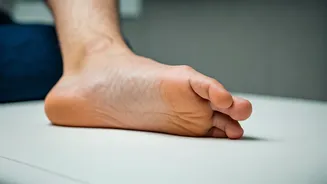Initial Subtle Clues
Vitamin B12 deficiency's initial indications frequently surface in the toes, often overlooked but potentially critical. One of the first things that people
notice is a tingling or pins-and-needles sensation. This occurs because the deficiency causes nerve damage, especially affecting the peripheral nerves which cause the sensation. People might mistake these symptoms for something else like fatigue or poor circulation. The slow progression of this damage makes it hard to detect the actual problem. Early recognition is key to preventing lasting harm.
Numbness and Its Impact
As the deficiency worsens, numbness becomes another prominent symptom. This numbness causes a lack of feeling in the toes, making simple actions like walking or standing uncomfortable. This lack of sensation is not just a nuisance; it increases the risk of injuries. Often, this symptom is a sign of significant nerve damage. The implications of this can be serious, because persistent damage might become irreversible if not addressed promptly. Understanding the significance of these changes in the toes is crucial for timely intervention.
Burning Sensations Emerge
A burning sensation in the toes is yet another indication of vitamin B12 deficiency. This constant burning pain comes from damaged nerves that send incorrect signals to the brain. This type of pain, known as neuropathic pain, can be extremely disruptive, affecting daily life. It's often misunderstood or misdiagnosed because it can resemble other conditions. Recognizing the cause is important for effective treatment, which can help prevent the pain from becoming chronic.
Cold, Pale Toes
Changes in the appearance of the toes are also linked to B12 deficiency. Reduced red blood cell production, caused by the deficiency, means less oxygen is delivered to the extremities. This lack of oxygen can lead to the toes feeling unusually cold or looking pale. Such a physical change often accompanies general fatigue or weakness, making it difficult to pinpoint the root cause without proper diagnosis. Considering the presence of these symptoms in conjunction with the other signs of deficiency aids in more accurate identification.
Loss of Coordination
Severe or prolonged B12 deficiency can negatively impact coordination, especially in the toes. This interference disrupts the nerves that govern precise movements, influencing balance while walking. This lack of stability increases the likelihood of stumbles and falls. These issues can have serious implications, impacting mobility and increasing the risk of injuries. Recognizing this symptom is crucial for those who are at a higher risk of falls.
Muscle Cramps and Twitches
Muscle weakness related to B12 deficiency may also cause toe cramps or spasms. These sudden cramps can be particularly troublesome, occurring at night or after physical activity, and can affect mobility. These muscle spasms can affect sleep and make it difficult to perform routine activities. Addressing the underlying B12 deficiency is key to alleviating these uncomfortable symptoms, which can considerably improve the quality of life.













